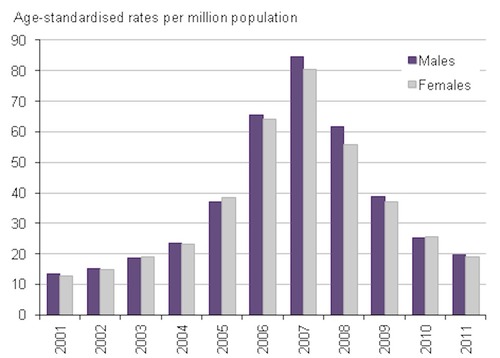Medical Breakthrough: 100,000 patients a year were dying from hospital acquired infections. Then in 2008, infection rates started plummeting. What brought about the improvement? Technical innovation? Academic studies? New drugs? Better procedures? Improved training? Checklists?
Nope. Hospital acquired infection declined as soon as the US government stopped purchasing them. For 40 years, Medicare and Medicaid paid hospitals for their most harmful mistakes — including causing hospital acquired infections, giving people bedsores, and leaving objects inside patients during surgery.
Then in 2005, a couple MBAs noticed the poor incentive structure. They pointed out that the government was spending $25 billion/yr (out of their $600 billion budget) on healthcare for “secondary diagnoses” — conditions that patients only contracted because they were unfortunate enough to be admitted to US hospitals.
Finally in 2007, the government announced it would no longer pay hospitals for infecting or injuring their patients. Since then, hospital acquired infection rates have been in free fall.
So what actually happened? Studies show that hospital workers began washing their hands again — up to a full 30% of the time! But no amount of abstract knowledge could motivate doctors to stop injuring 1 in every 20 patients until there was no longer a government billing code for “failure”.

9 Responses to “Medicare Will Not Pay For Hospital Mistakes And Infections, New Rule”
November 25
Carl YoungbloodLouie, the original source does not seem to contain the text you quoted. Did you make a mistake?
November 25
Louie HelmI wrote this story and it’s based on multiple sources.
I’m not quoting text.
November 26
Carl YoungbloodSorry, the theme of your blog is a little confusing because it makes your posts start with a huge quotation mark. Sorry for the mixup.
November 26
Carl YoungbloodI was also trying to find the source of the data about hospital-acquired infection rates. I couldn’t see it in the article on Medical News Today.
November 26
Louie HelmFrom MNT: “Hospital acquired infections kill nearly 100,000 Americans a year, according to the Centers for Disease Control and Prevention (CDC), with 2 million patients needing treatment that costs over 25 billion dollars a year.”
Similar statistics are listed on the Wikipedia link in my article too… which relies on a NY Times article as an immediate source.
They’re all referencing the CDC’s numbers for this.
November 26
Carl YoungbloodOK. Yeah, I was wondering where the graph came from with the historical data. I was trying to figure out where we can observe that “hospital acquired infection rates have been in free fall.” It sounds like an awesome newsworthy item if I can just get more hard data indicating that the change in incentive structure has been the cause of a significant change. I’ll look at the CDC for more information, but if you have any pointers, that would be great too.
November 26
Louie HelmGraph is of c.diff infection rates. MRSA rates have done a similar dive. I’ve read that UTI rates (the largest component of HAIs) have gone down significantly too but did not see hard numbers/graphs. I haven’t dug around enough to find a table with full CDC statistics on overall rates but would welcome the help confirming that the overall trend follows all the sub-section trends.
As another data point that financial incentives from medical policy strongly drive practice, see this brief write-up about the effect of incentives on Electronic Health Records:
https://blogs.sph.harvard.edu/ashish-jha/a-strong-start-on-a-long-path/
November 28
The total information world - Gene Expression | DiscoverMagazine.com[…] trust medical professionals to always behave out of the goodness of their hearts, consider that deaths from hospital infections started dropping sharply when Medicare stopped paying for treating t…. Workers in the health care sector do care about patients, but even here incentives matter, and the […]
November 28
The total information world | Biology News by Biologged[…] trust medical professionals to always behave out of the goodness of their hearts, consider that deaths from hospital infections started dropping sharply when Medicare stopped paying for treating t…. Workers in the health care sector do care about patients, but even here incentives matter, and the […]